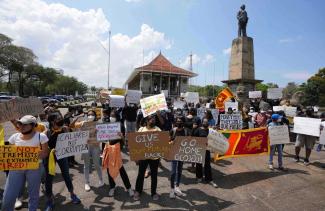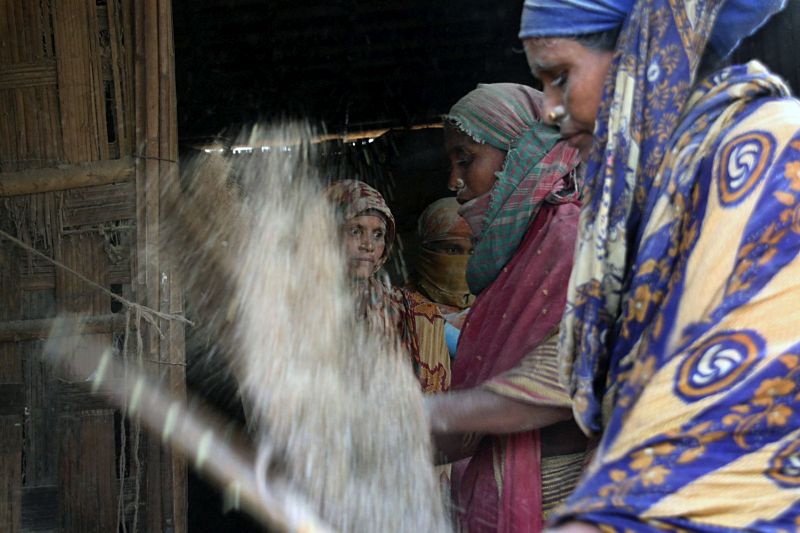IMF
The role of the IMF in the global debt crisis

Kristalina Georgieva, managing director of the IMF, and David Malpass, the president of the World Bank, are among the loudest voices calling for fast debt relief for critically indebted countries. But instead of encouraging countries that are at risk of debt distress to restructure their debt, the IMF has a pattern of avoiding this advice to individual cases. Country reports only mention debt restructuring rather hesitantly as a possible option. The IMF is similarly reluctant to make restructuring a precondition for granting new loans.
In more than 100 analyses that it conducted from November 2020 to January 2022, the IMF only cited debt relief as a possible option for five of 44 countries at high risk of over-indebtedness. The five countries are Angola, the Seychelles, Malawi, Chad and Suriname. Suriname was actually already in default, and debt restructuring negotiations were underway for Chad. In all other cases, the IMF either did not consider restructuring or did not mention it as a way to improve debt sustainability. This stance is problematic given that the IMF's recommendations serve as guidelines for governments.
Problems of the IMF's own making
This is even more relevant when the IMF serves as lender of last resort in a time of crisis. According to its own statutes, it may only lend to countries whose ability to repay the IMF is highly probable. If the IMF decides that this is not the case, it must make any new loan dependent on the country’s creditors reducing the burden by cancelling at least some of the debt.
This rule makes sense because a debtor state could otherwise use IMF money to postpone an inevitable debt restructuring, using the new loan to continue servicing the old ones. If a country is not just temporarily short of cash, but actually overindebted, however, it is most unlikely to get back on its feet again without debt relief.
If debts are paid with IMF loans, but restructuring later becomes unavoidable nonetheless, we must assume that some creditors will have pulled out of the country, shying away from any contribution to solve the crisis. By implication, multilateral lenders like the IMF would have to shoulder a larger burden and future debt restructuring would become even more difficult. The reason is that loans from multilateral lenders like the IMF are considered non-restructurable.
In the 1980s, debt was shifted from private to public multilateral lenders that way. As a result, many countries’ debt problems dragged on for a long time. When debt relief was finally granted, not all creditors contributed equally. A similar trend is evident in recent years
Record lending in the crisis
In 2022, the IMF lent money at record levels for the third year in a row. However, it also considers over half of low-income countries to be overindebted (see Kathrin Berensmann on www.dandc.eu). The institution is clearly not adhering to its own guidelines. It has issued loans even in cases where it identified a high risk of overindebtedness, without demanding restructuring first.
While the IMF is very reluctant to recommend restructuring, it does not hesitate to demand rather stringent adjustment measures in debtor countries. Fiscal consolidation is the Fund’s standard recommendation to reduce the debt ratio. Thus budgetary cuts are now planned in 94 low- and middle-income countries for 2023, according to a report written by Isabel Ortiz and Matthew Cummings (2022), two high-profile IMF observers.
This trend has been evident since the mid-2010s. It was only briefly interrupted in 2020 because of Covid-19. It is true that this is not in all cases due to IMF conditionalities. Nonetheless, the IMF is co-responsible for budget cuts being seen as unavoidable in many countries due to its annual surveys and recommendations.
The most common consolidation measure in the global south is to reduce welfare spending. That is being planned in 88 countries. Social services will henceforth only be available to those who are supposedly truly needy, and a large share of low-income households will be excluded.
In order to increase revenues, governments typically do not rely on progressive taxes on income, corporate profits or wealth. Instead, they focus on consumption taxes which place the greatest burden on those with the lowest incomes. The costs of the debt crisis are thus passed on to the people. Internal IMF analyses show that measures of this kind often make the economic situation deteriorate further.
Downsizing relief
When debt restructuring negotiations do indeed begin, creditors rely on IMF calculations on the necessary debt relief envelope. In the past, the Fund has repeatedly minimised that need, for instance by making particularly optimistic forecasts about future economic growth. That happened in the case in Greece after 2010, for example.
Even today, such scenarios seem likely. Consider for example the cases of Sri Lanka and Zambia. In first, the IMF appreciates the necessity of restructuring, and in the second, related negotiations are underway. In both cases, however, the IMF based its calculations on budget surpluses that exceed those of neighbouring countries. With regard to Zambia, moreover, the IMF only recommended easing debt-service requirements, but did not propose cutting the debt level. The irony is that internal IMF studies show that restructuring tends to be more effective in restoring debt sustainability when they reduce the capital that must be paid back.
Influence on other creditors in restructurings
The current debt crisis is also marked by individual creditors – and groups of creditors – showing little interest in debt restructuring. The IMF could make a difference however.
First of all, multilateral development banks and the IMF should stop insisting that their claims cannot be restructured under any circumstances. In at least 38 low-income countries, multilateral obligations make up over 50 per cent of outstanding external debt. As long as the World Bank, the IMF and similar bodies refuse in principle to renegotiate their own claims, it is understandable that other creditors will also remain unwilling to make concessions.
Second, the IMF can exert pressure on uncooperative creditors through its lending policy. The Lending into Arrears Policy allows the IMF to make financing available to highly indebted countries even when they are in arrears to private or public creditors. Proactive use of this policy, like IMF Director Georgieva proposed in December 2021, could encourage creditors to agree to the necessary debt relief measures.
Reforming IMF practice
For a timely and fair solution to the current debt crisis, current IMF practice must change.
- First of all, in the case of critically indebted countries, the institution should mention debt restructuring and debt relief as standard options in the annual country reports.
- Second, when the debt burden of an applicant country is critical even though it is still servicing loans, restructuring must become a precondition of the IMF issuing a new loan.
- Third, the conditions of debt relief must be based on realistic forecasts of a country’s future economic development.
- Fourth, adjustment measures must not reduce benefits to vulnerable groups.
- Finally, the IMF should use its resources to boost the willingness of other creditors to agree to debt relief. For that purpose, it must question the exempt status of its own claims in restructuring negotiations.
No sensible and detailed criticism of the IMF should lose sight of the fact that faulty IMF policies result from a structural inequality. On top of the reforms proposed here, it is thus necessary to reduce the IMF's scope of duties and distribute them among various institutions in the UN system, as Jürgen Kaiser proposed in 2018 on www.dandc.eu.
Kristina Rehbein is a political coordinator at Erlassjahr.de.
Malina Stutz is a political consultant at Erlassjahr.de.
m.stutz@erlassjahr.de
Reference:











